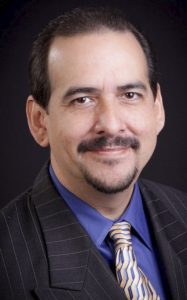
Life came fast at Larry Mendez.
He dropped out of high school in Tyler, Texas, at age 16, the same age as his mother when she gave birth to him and subsequently dropped out to support him. His father had dropped out of high school to help provide for his own mother and eight siblings.
After leaving high school during his junior year, his work options were limited and driven by the most primitive of needs: hunger.
“So I started working at Burger King,” Mendez said. “But I progressed to upper management, and that led me to Houston, Texas, Shreveport, Louisiana, and the Dallas area, and that kept me moving forward in a career.”
By age 21, Mendez was married and had three kids. By age 28, he was divorced and needed to “retool” – a humbling experience that saw Mendez move back to Tyler to live with his parents and attend the junior college he once scoffed at when he was in high school.
“Tyler Junior College was the college my parents said they’d help me go to,” Mendez said, “but I wanted to go to Baylor. Before I dropped out … I didn’t realize we were poor. We lived in an OK neighborhood, and I always thought we had at least enough money to send me to college. I got discouraged by that. No one I knew had been to college.”
His curfew at age 28 was 10 p.m. – the time his parents went to bed each night. While attending TJC, Mendez worked part-time at a Golden Corral.
“I was the ‘roast beef or turkey?’ guy,” Mendez said. “I just needed enough money to pay child support.”
Mendez’s first steps into higher education were rocky. He almost didn’t make it through his first summer. He told his instructor, Shelly Kersh, he was going to drop out, but she mentored him and helped him reach the GPA required to enter a burgeoning computer networking program, which, in 1995, was growing due to the rise in internet connectivity and accessibility of affordable personal computers.
Mendez would earn his associate degree in 1997 and become an adjunct instructor at TJC in 1998. He would later earn

a bachelor’s degree in business administration at LeTourneau University and a master’s degree at American Intercontinental University. By 2008, Mendez had ascended from GED recipient to chief information officer at the same junior college that jumpstarted his education — and where he’d meet his wife of 20 years, Hazel.
Mendez couldn’t stop there. He was in his 40s and beginning to think about a greater role in higher education administration. He didn’t know where he would pursue a doctoral degree, but he knew two things: he wanted a flexible program that blended distance learning and in-person classes, and he a wanted degree from a prominent university.
In 2009, Mendez began the executive EdD program in Higher Education at The University of Alabama.
“My master’s content was extremely difficult, and working at a distance at that timeframe was difficult,” Mendez said. “So when I got ready to pursue a doctorate, one thing I wanted was butts in seats, but I couldn’t really take off the time needed. UA offered that balance and a program designed to get you out in two to three years.”
For the first 27 months of the program, Mendez commuted from East Texas to Tuscaloosa to participate in the in-person classes on campus. The classes would span from Thursday afternoon through Saturday afternoon, covering more than 20 hours.
“My cohort, with the way they’d designed it, they attempted to find individuals from all parts of a college – career-minded, already there, working in admissions, student support, etc.,” Mendez said. “So it really worked in my favor, as far as being selected, that I had a unique background in IT.
“The goal was to get everyone in and out in two or three years,” Mendez said. “We were all taking the same classes, discussing the same content. The draw for me was, as long as I could get there, everything else was covered in my tuition, like meals.”
Mendez’s doctoral studies stretched well beyond the two-to-three years estimate – nearly eight years – due in part to his dissertation, an extensive case study of a grant program at Southwest Texas Junior College. The grant was the last major foundation-funded demonstration program for rural higher education innovation, which was initiated by the Ford Foundation’s Rural Community College Initiative, which ran from 1995-2002, said Dr. Stephen Katsinas, director of the UA Education Policy Center. Katsinas had previously analyzed potential outcomes of the grant for the Ford Foundation and was later Mendez’s dissertation chair at UA.
Mendez presented his dissertation at the Council for the Study of Community Colleges’ annual meeting in Fort Worth, Texas in April.
“Larry examined how foundation-funded activities to promote access and economic development became embedded in the life of a Hispanic-serving college in one of the poorest, most sparsely populated areas of our country,” Katsinas said. “Enrollment more than doubled as the college expanded its mission to become regional in nature, even as state funding declined. It’s a truly amazing story, written by a truly amazing doctoral student.”
Mendez said he’ll be able to retire in five years and will most likely pursue consulting work for community colleges, which need help in fixing business processes, budgeting and efficiency through the use of technology.
Mendez expects five members of his family to attend commencement ceremonies this weekend.
“It’s been a long road, but I think about my mom and dad, and their foundation that I preach today: accountability, responsibility and integrity,” Mendez said. “They worked hard, and both retired from a factory. They set a great example and were always there for me.”
Contact
David Miller, UA Media Relations, 205/348-0825, david.c.miller@ua.edu
Source
Larry Mendez, doctoral student, College of Education, ldmendez@crimson.ua.edu
